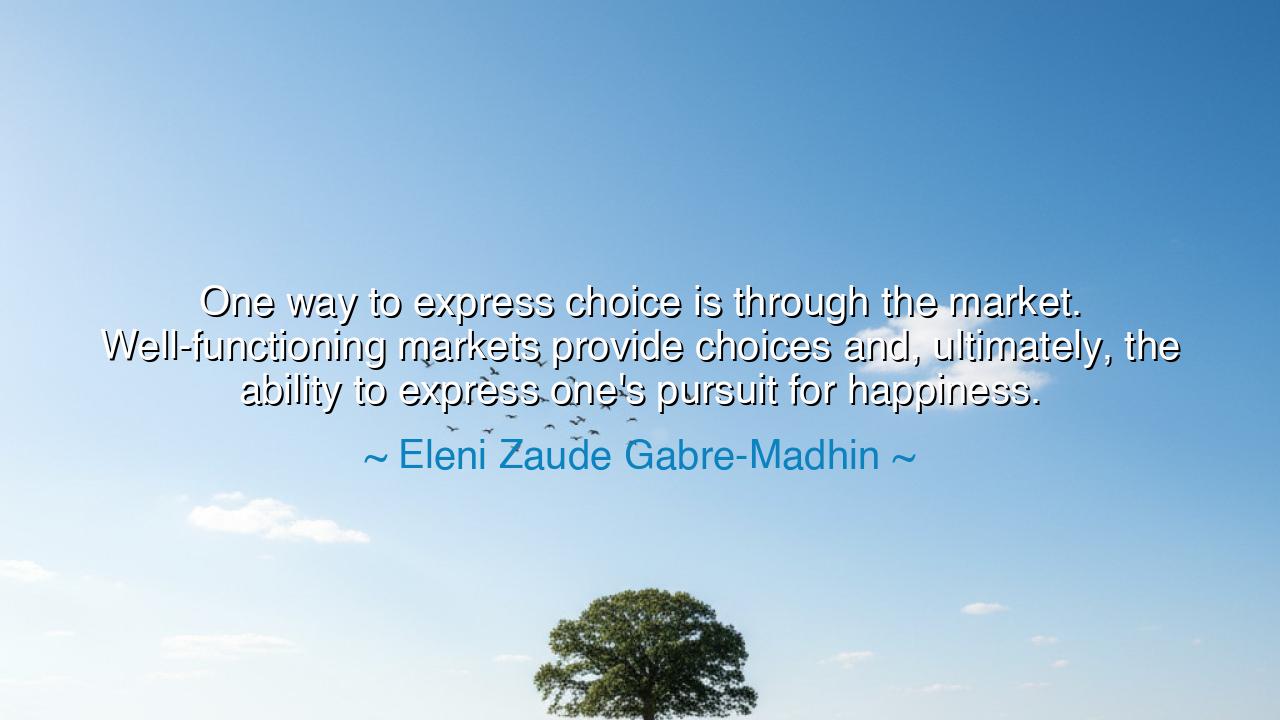
One way to express choice is through the market. Well-functioning
One way to express choice is through the market. Well-functioning markets provide choices and, ultimately, the ability to express one's pursuit for happiness.






When Eleni Zaude Gabre-Madhin declared, “One way to express choice is through the market. Well-functioning markets provide choices and, ultimately, the ability to express one’s pursuit for happiness,” she was not merely speaking as an economist, but as a philosopher of human freedom. Her words are rooted in the timeless understanding that choice is the essence of dignity, and that the ability to choose—whether in trade, in life, or in thought—is the measure of a free people. The market, in her vision, is not simply a place of goods and prices, but a living reflection of the soul of a society—a realm where creativity, effort, and aspiration meet to form the pulse of human progress.
Born in Ethiopia, Eleni Gabre-Madhin witnessed the suffering that arises when markets fail—when farmers have no access to fair trade, when abundance turns to famine because the channels of exchange are broken. Out of that sorrow, she forged a vision: that markets, when just and transparent, are not instruments of greed, but tools of empowerment. In her eyes, the marketplace is sacred ground where human potential can manifest, where each individual—rich or poor—can exercise the divine right of choice. Through her work in creating the Ethiopian Commodity Exchange, she sought to give voice to farmers long silenced by isolation, transforming despair into opportunity, and chaos into connection.
In the ancient world, the great agoras of Greece and the bazaars of the East were more than centers of commerce—they were the heartbeats of civilization. There, ideas were exchanged alongside goods; innovation grew beside negotiation. A farmer could trade grain for oil, but also learn of new lands, new inventions, new ways of life. The market was the proving ground of both mind and spirit, for in its diversity of choices, people discovered not only how to live, but why they lived. Thus, Gabre-Madhin’s words echo an ancient truth: that freedom and prosperity are born not in isolation, but in exchange—the exchange of goods, of ideas, and of hope.
To understand her wisdom, one must see that the market she speaks of is not merely economic, but moral. A well-functioning market, she says, provides not just profit, but possibility. It is the structure that allows the poor farmer to dream, the craftsman to innovate, the merchant to connect distant lands. When the market is fair and open, each person’s labor gains meaning; each person’s dream finds a path. In such a world, the act of trade becomes an act of trust, and choice becomes the language of human expression. The pursuit of happiness, therefore, is not an idle wish—it is the sacred consequence of a society that values freedom through honest exchange.
Consider the story of Adam Smith, the philosopher of Scotland who, in the 18th century, observed the bustling markets of his day and discerned a hidden order within them. He saw that when people are free to work, create, and trade without oppression, a kind of invisible harmony arises—a self-correcting rhythm that serves both individual and community. Yet even Smith warned that markets must be guided by virtue, for without integrity and fairness, they turn from instruments of freedom into engines of inequality. Gabre-Madhin stands in that same lineage of wisdom: her vision is of a moral marketplace, one that reflects the heart of its people and uplifts the weakest among them.
Her words, then, are not the cold reasoning of an economist, but the warm invocation of a healer of nations. In her voice, we hear the cry of countless farmers who toiled in silence, unable to reap the fruits of their labor. In her vision, we see marketplaces that not only feed the body but dignify the spirit. For happiness—true happiness—is not found in wealth alone, but in agency, in the power to choose, to work, to aspire, to exchange one’s labor for one’s dreams. The market, when just, becomes a mirror of humanity’s higher nature—a place where cooperation triumphs over greed, and where progress becomes the shared destiny of all.
So let the listener take this lesson to heart: freedom without structure breeds chaos; structure without freedom breeds despair. A fair market is the balance between the two—a field where freedom is disciplined by fairness, and fairness is strengthened by freedom. Whether in business, in community, or in the soul, the principle remains the same: give people the right to choose, and they will create; give them justice, and they will thrive. To honor Eleni Gabre-Madhin’s wisdom is to believe that every exchange, however small, carries the power to shape destiny.
Therefore, children of the future, remember this: build markets that reflect the heart, not just the hand. Let your trades be honest, your choices informed, your ambitions kind. For the true wealth of a people lies not in gold or goods, but in the abundance of their freedom. When the market becomes a place of dignity, when every soul has the power to choose their path, then indeed—as Eleni said—choice becomes the language of happiness, and the marketplace becomes not a battlefield of profit, but a symphony of human possibility.






AAdministratorAdministrator
Welcome, honored guests. Please leave a comment, we will respond soon